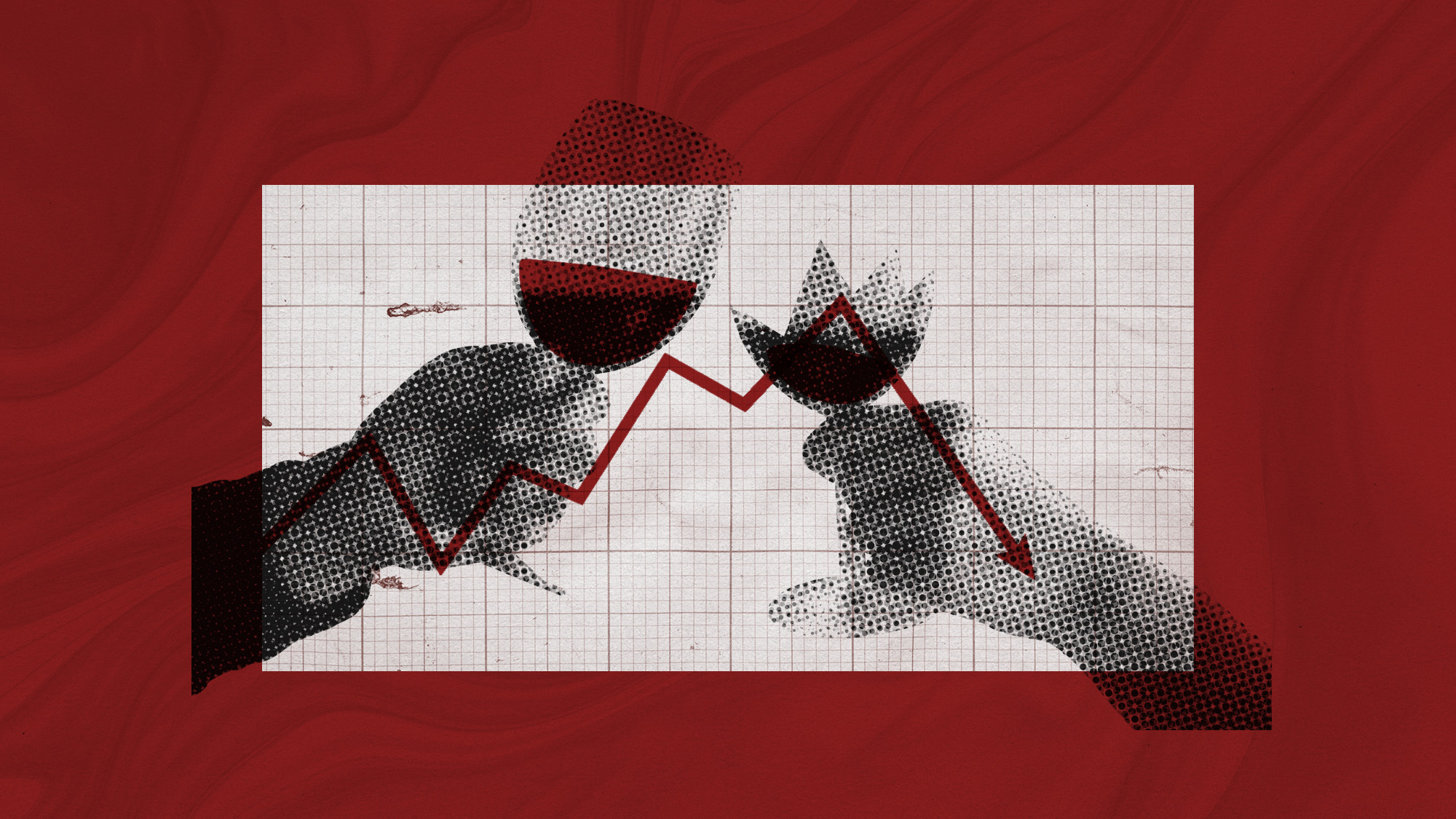The wine industry is getting pressed as young people drink less
The once-dominating drink is not aging well


A free daily email with the biggest news stories of the day – and the best features from TheWeek.com
You are now subscribed
Your newsletter sign-up was successful
Wine has been a longtime staple of both history and culture. The oldest evidence of winemaking dates back to the Stone Age, and wine has since been immortalized in Greek mythology by the wine god Bacchus, swilled by Paul Giamatti in the Academy Award-winning movie "Sideways" and celebrated by housewives with "it's wine o'clock somewhere" home decor. But younger people are drinking less than previous generations — and those who do drink are frequently opting for beer, spirits or even marijuana. As a result, the wine industry is struggling.
Why new generations avoid the grape stuff
Young people are often making healthier lifestyle choices and have therefore grown wary of alcohol's detrimental effects. According to 2023 Nielsen data, "45% of Gen Z consumers (21 and up) say they've never consumed alcohol," said The San Francisco Chronicle. A Gallup poll additionally revealed that "as of 2023, 52% of people between the ages of 21 and 34 believed moderate drinking is bad for your health." They are not incorrect: In a damning report last year, the World Health Organization announced that no level of alcohol consumption is safe.
Although wine is "the overwhelming choice among those 65 and older," said wine critic Eric Asimov for The New York Times, it is not the choice of younger people. Instead, Gen Xers and millennials have gravitated to craft beer and cocktails with high-end spirits. "While past generations started drinking affordable reds and whites in their early 20s," said Forbes, today's youth have more choices. "They can sip on thoughtfully made hard seltzers, craft canned drinks or make more interesting cocktails."
The Week
Escape your echo chamber. Get the facts behind the news, plus analysis from multiple perspectives.

Sign up for The Week's Free Newsletters
From our morning news briefing to a weekly Good News Newsletter, get the best of The Week delivered directly to your inbox.
From our morning news briefing to a weekly Good News Newsletter, get the best of The Week delivered directly to your inbox.
One unsurprising reason younger people are avoiding wine is the cost. Good wine is generally more expensive than beer or spirits, and millennials notably have less disposable income, less job security and more student loan debt than their parents did.
The wine industry's arguable inaccessibility is another hurdle, as it has "pigeonholed itself into being something for the elite," Brandon Hofherr, the marketing director for St. James Winery, said to Forbes. Young consumers have more of a vested interest in social justice and environmental issues, too. But the wine industry has been "slow to adapt" to these changes and has a long way to go to make it a "more welcoming, inclusive place," said Asimov.
The industry feels the squeeze
As younger consumers lose interest and baby boomers age out of drinking, the wine industry is suffering from oversupply. "There are too many grapes planted in states like California and Washington for wines sold under $12, a price point that has experienced a drop in demand," said Fast Company. Visits to winery tasting rooms have simultaneously "dropped for two straight years."
California wine grape growers now find themselves "having to compete with bargain-basement wine prices from overseas growers eager to rid themselves of aging supplies," said the Los Angeles Times. Imported foreign wine has been a bugbear for the state, in addition to the trials of wildfires, drought and rising labor costs. Now, growers in Lodi — the most diverse wine growing region in the U.S. — are "being urged by industry representatives to remove tens of thousands of acres of vineyards to balance supply with demand."
A free daily email with the biggest news stories of the day – and the best features from TheWeek.com
This is not merely an American problem. France has spent more than $200 million to destroy their excess wine as demand falls, and Australian vineyards have had to stockpile two years' worth of production due to a lack of buyers.
For individual oenophiles, this is technically good news: At the moment, there is a wide variety of choices at low prices. But these recent developments are troubling for the industry at-large, as the need to destroy acreage and wine itself becomes more common and a lack of demand means that "higher prices cannot be charged, despite the higher costs inherent to the industry," said food and wine critic John Mariani at Forbes. Still, Mariani expects that good wine will not go anywhere anytime soon. "The industry's woes are wine lovers' big win," he said.
Anya Jaremko-Greenwold has worked as a story editor at The Week since 2024. She previously worked at FLOOD Magazine, Woman's World, First for Women, DGO Magazine and BOMB Magazine. Anya's culture writing has appeared in The Atlantic, Jezebel, Vice and the Los Angeles Review of Books, among others.
-
 Nuuk becomes ground zero for Greenland’s diplomatic straits
Nuuk becomes ground zero for Greenland’s diplomatic straitsIN THE SPOTLIGHT A flurry of new consular activity in the remote Danish protectorate shows how important Greenland has become to Europeans’ anxiety about American imperialism
-
 ‘This is something that happens all too often’
‘This is something that happens all too often’Instant Opinion Opinion, comment and editorials of the day
-
 House votes to end Trump’s Canada tariffs
House votes to end Trump’s Canada tariffsSpeed Read Six Republicans joined with Democrats to repeal the president’s tariffs
-
 Companies are increasingly AI washing
Companies are increasingly AI washingThe explainer Imaginary technology is taking jobs
-
 Buffett: The end of a golden era for Berkshire Hathaway
Buffett: The end of a golden era for Berkshire HathawayFeature After 60 years, the Oracle of Omaha retires
-
 Why is pizza in decline?
Why is pizza in decline?In the Spotlight The humble pie is getting humbler
-
 How prediction markets have spread to politics
How prediction markets have spread to politicsThe explainer Everything’s a gamble
-
 Tariffs have American whiskey distillers on the rocks
Tariffs have American whiskey distillers on the rocksIn the Spotlight Jim Beam is the latest brand to feel the pain
-
 TikTok secures deal to remain in US
TikTok secures deal to remain in USSpeed Read ByteDance will form a US version of the popular video-sharing platform
-
 SiriusXM hopes a new Howard Stern deal can turn its fortunes around
SiriusXM hopes a new Howard Stern deal can turn its fortunes aroundThe Explainer The company has been steadily losing subscribers
-
 How will China’s $1 trillion trade surplus change the world economy?
How will China’s $1 trillion trade surplus change the world economy?Today’s Big Question Europe may impose its own tariffs
